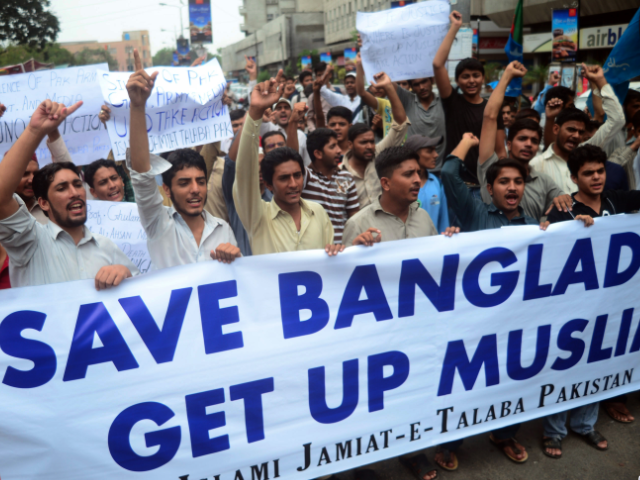What’s really spreading extremism in Bangladesh?

A leading opposition politician in Bangladesh issued a dire warning earlier this week. BNP Vice Chairman Hafizuddin Ahmed told an audience that, “this country will soon become a militant state if the government doesn’t create a scope for restoration of democracy.” Mr. Ahmed followed this call for democracy by completely unironically calling on his supporters to prepare to take to the streets to forcibly overthrow the government. Mr. Ahmed’s demand for greater democracy while simultaneously encouraging political violence is a hallmark of Bangladesh’s notorious “winner take all” politics. What is a greater cause for concern, though, is his warning about the possibility of Bangladesh transforming into a militant state.
The first thing to note about Mr. Ahmed’s warning is that it makes no sense in a historical context. Bangladesh has experienced several period of undemocratic rule in its short time as an independent nation. The first time democracy was suspended in Bangladesh was in 1975, when junior military officers assassinated the country’s president, Sheikh Mujibur Rahman and most of his family, as well as several federal ministers and party leaders. This was followed by a six-year period of rule under, ironically, the founder of the BNP, General Ziaur Rahman. Gen. Rahman was himself assassinated in 1981, and was replaced by another military dicator, Gen. Ershad who ruled from 1982 to 1990.
And so it wasn’t until the 1990s that some semblance of democracy really returned to Bangladesh. Thus began the ping-pong between BNP and Awami League administrations, each inaugurated following elections overshadowed by violence and ballot tampering. Still, during 15 years of undemocratic rule, Bangladesh had not shown signs of gravitating towards a militant or extremist state even as Gen. Ziaur Rehman himself was ushering in an Islamization of his own (though far less radical than that of his Pakistani counterpart, Gen. Ziaul Haq).
If Bangladesh did not become a militant state during an extended period without democracy, why would Bangladesh be in danger of becoming a militant state today when the country does operate under democratic rule, however imperfect it may be? Bangladesh is not the only democracy in the world that suffers from imperfect elections and institutions. To find an answer, we may be better served by looking at the time in which extremism began to take root in Bangladesh.
The truth is, Islamist extremism has always been present in Bangladesh in some form. The Islamist organization Jamaat-e-Islami carried out a terror campaign to try to stop Bangladesh’s secession from Pakistan in 1971. The vivid memory of Jamaati violence coupled with a nationalism based in Bangladesh’s syncretic culture helped inoculate the country against the scourge of extremism for decades. But Islamic extremism did creep in, largely through the same channels that spread it throughout South Asia: Saudi-funded mosques and radical organizations like Hefazat-e-Islam. Jamaat-e-Islami, too has received large amounts of funding from Saudi Arabia which they have put to use expanding their political base, especially in rural areas, and works closely with Hefazat-i-Islam to try to force its radical agenda on the rest of the country.1
In fact, it was the BNP who was in power in 2005 when the terrorist group Jamaat-ul-Mujahideen Bangladesh (JMB) demonstrated the extent of its reach and sophistication of its operations by simultaneously detonating a series of around 500 bombs at 300 locations in 63 of the country’s 64 districts. This attack was followed by a number of targeting attacks against judges and other public figures. All of this occurred after fourteen years of democracy and during a BNP administration. According to a former BNP lawmaker, the rise of Islamist militancy in Bangladesh was the result of the BNP’s strategy of sheltering and patronizing extremist groups in order to expand its political base.
It is this strategy of using Islamist groups for political ends that has facilitated the growth of militancy in Bangladesh, not imperfect democratic processes. The Awami League needs to make an effort to ensure that future elections are transparent and fair so that the problems with April’s city elections are not repeated. Furthermore, while Bangladesh’s Ambassador to the US is correct in saying that no one is above the law, and it is encouraging that Awami League leaders have not been spared in crackdowns on extremists. But government officials must also ensure that law enforcement agencies are not engaging in arbitrary arrests of opposition leaders. Respect for human rights and strong democratic processes are key factors to political stability.
Stemming the tide of radicalism and militancy in Bangladesh, though, requires much more than putting an end to the country’s long and violent history of “winner take all” politics. The Awami League must take a strong stance against extremism and take action against militant groups and their backers both at home and abroad. Moderate and liberal Bangladeshis must feel secure. As for the BNP, if the opposition is going to provide a viable alternative to the Awami League, it must be able to credibly assert that it would be able to do the same. That requires abandoning the politics of disruption and its collaboration with Islamist groups to bring the government down.
1 Karlekar, H. (2005). “Bangladesh: The Next Afghanistan?” SAGE Publications Pvt. Ltd. pg. 53.